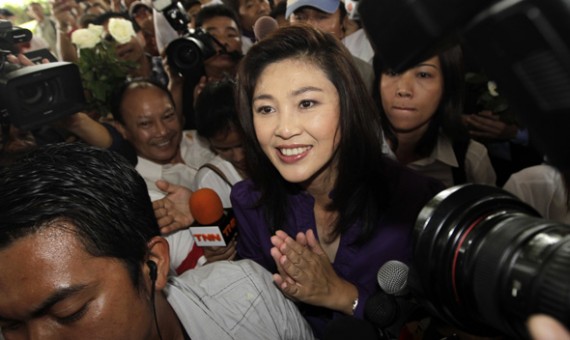Thailand’s Elections: First Take
More on:

On Sunday, Thai voters went to the polls for the first time since, in 2008, the Democrat Party, supported by Thailand’s traditional elites, maneuvered its way into power through legislative wrangling backed by the army and the palace. It was also only the second election since the 2006 coup, which deposed the government of Thaksin Shinawatra, who previously had been the most powerful prime minister in Thai history, but gained much of his support from the poor, and was extremely unpopular with Thailand’s traditional elites.
The result of Sunday’s vote was an overwhelming rejection of both the coup and the 2008 manuevering, and a vote of confidence for Thaksin’s party, now run by his youngest sister, Yingluck. (Since the 2006 coup, Thaksin has lived in exile, mostly in Dubai, but has remained the power behind the scenes in his party and, in the election campaign, called Yingluck “his clone.”) Riding high voter turnout, Yingluck and Thaksin’s party won an absolute majority of the 500-seat lower house of parliament, which will almost certainly make Yingluck the country’s first female prime minister. She made add to her power by allying with several smaller parties that won a handful of seats. The vote further signified that Thai politics have been changed forever by Thaksin, who despite his policies in office that undermined the rule of law and often abused human rights, has been the first figure to empower the Thai rural poor, who comprise the majority of the country, and lead them to be politically engaged. Voting together, the poor and lower middle classes, as well as small businesspeople from outside the capital, have now become the dominant force in electoral politics, a sharp lesson to the traditional forces--the monarchy, the army, the bureaucracy, and Bangkok-based elites and middle classes--who have dominated Thailand for decades. The Democrat Party, voice of the traditional elites, now has lost every election since 1992.
However, there is no guarantee that Thailand’s traditional power brokers are going to concede their dominance gracefully. Yingluck’s win means that Thaksin is likely to return to the country at some point, receiving some kind of amnesty for crimes he was convicted of after the coup. He is the most divisive figure in Thailand, and his potential return, combined with the big victory, could trigger traditional elites’ meddling with the electoral results. Such meddling could include using the judiciary to overturn many of the individual parliament race decisions, a move tried in previous elections; using the judiciary to outlaw Yingluck; or even an outright coup again--though the current army commander has vowed not to stage a coup and has been engaged in reconciliation talks with Thaksin’s representatives, he is known as an archroyalist and traditionalist, and hates Thaksin.
Given Yingluck’s landslide, the United States, the most important foreign player in Thailand, should move quickly to applaud the free and fair election and support the formation of the government Thais have elected, run by Yingluck’s party. Meanwhile, if traditional powers attempt to overthrow the result, either through judicial interference or an outright coup, Washington should come down hard on Thailand, including potentially canceling many aspects of the United States’ close military relationship with Thailand.
More on:
 Online Store
Online Store
